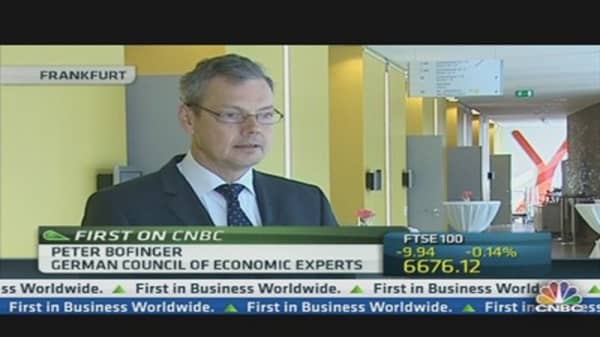Germany's economic data, released on Wednesday, are concerning because they show "de-facto stagnation," one of Angela Merkel's top economic advisors and one of the country's five "wise men" has warned.
Peter Bofinger, who sits on the government's council of economic advisors, told CNBC on Wednesday that austerity policies would have to be scaled back and the European Central Bank must do more to help the euro zone economy.
(Read More: France Slides Into Recession, Germany Disappoints)
"The data shows that the worst of the euro crisis is not yet over, we are in the middle of the crisis and even worse, the crisis is spreading from the weak peripherals to the core and this is something that policy makers should be very much concerned about," Bofinger, who sits on the German government's council of economic advisors, told CNBC.
The German economy grew just 0.1 percent in the first quarter, compared to the previous three months, data released on Wednesday showed. GDP missed expectations for a 0.3 percent increase and disappointed those who had hoped for a bounce back from the surprisingly weak fourth quarter of 2012. The data for that quarter were also revised down to -0.7 percent from -0.6 percent previously.
Cold weather hampered the rebound, but underlying trends were softer too, and only private consumption drove the small growth in the first quarter. Even Germany's traditionally strong exports failed to pick up steam.
The economy and the crisis in the euro zone are likely to be center-stage in Germany's elections, which are due in September.
(Read More: Markets Take 'Glass Half Full' View of Weak European GDP)
But Bofinger doesn´t believe the weak data would negatively affect Angela Merkel's re-election bid unless it has a stronger effect on the labor market. That takes time, he said, and Merkel will likely go into the elections with a "relatively strong labor market." Germany's unemployment rate of 6.9 percent is better than that of the U.S. and much better than the euro zone average.
Bofinger stressed that the "debate on austerity will have to be opened again", questioning whether the overall fiscal stance should be restrictive, instead of expansionary, given the euro area recession.
Asked whether Angela Merkel, if re-elected, would have to bow to pressure and change her austerity policies, Bofinger said:" A paradigm shift is inevitable, the longer the recession lasts, the more it spreads. (…) A rethink of the paradigm must come with more time for consolidation, otherwise it is contra-productive. And at the same time, we to think about measures on how to boost growth and also measures, strong measures to do something against unemployment, especially youth unemployment."
(Read More: Le Big Debate: France Triple-Dip or Not?)
But Angela Merkel isn't the only policymaker Bofinger called on. Given the softening data in the first quarter and the current quarter, Bofinger said Mario Draghi and the ECB should take "a more courageous approach."
"I don't know why the ECB is so timid, given the situation was bad enough two weeks ago."





